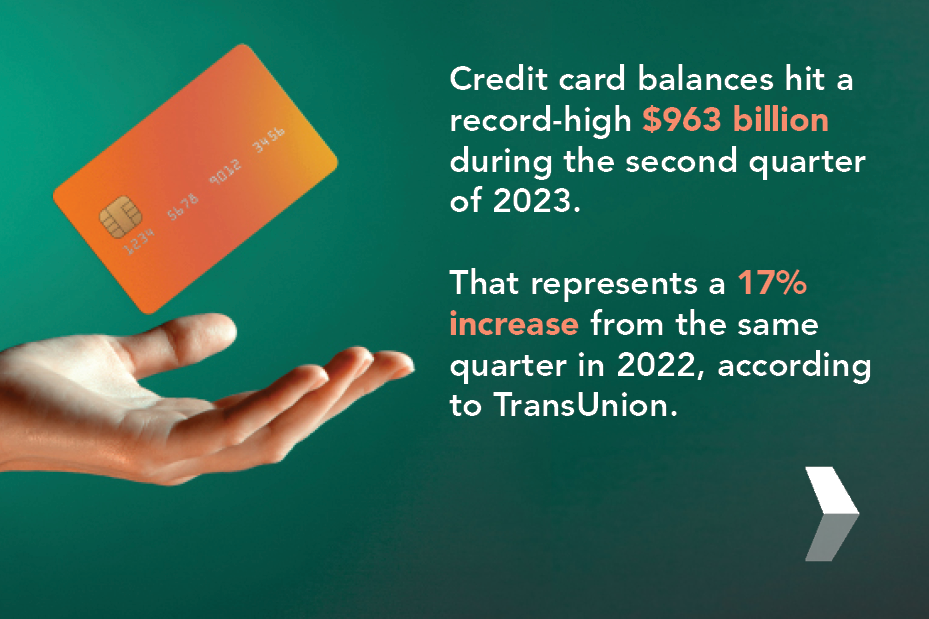Jingle All the Way to Debt-Free Living: How Debt Consolidation Helps Homeowners
Lynden Carnahan, Sr. Mortgage AdvisorNovember 13, 2023 — 9 min read

The year is coming to a close, and as families gear up for gatherings and gift exchanges, many grapple with a troubling trend—for the first time, credit card debt in the U.S. has surpassed $1 trillion, according to the Federal Reserve Bank of New York. However, in the midst of this financial stress, debt consolidation can be a beacon of hope—a safe and easy answer to the burden of high-interest debts.
By consolidating debts, families can leverage equity to combine multiple high-interest debts into a single rate, making it possible to pay off what they owe more efficiently; additionally, debt consolidation can extend the repayment period, easing immediate financial pressure and providing families with breathing room to regain control over their finances.
With the right guidance and a well-structured plan, debt consolidation becomes a powerful tool, helping families reclaim financial stability and usher in the new year with renewed optimism and confidence. Keep reading and take the first step toward a brighter, more secure tomorrow.
The Burden of Mounting Debt
The burden of mounting debt poses significant challenges for individuals aspiring to achieve homeownership. These financial obligations impact their immediate ability to save for a down payment and have far-reaching effects on their debt-to-income ratio, a crucial factor considered by lenders when evaluating mortgage applications.
Impact of student debt.
In a recent study, millennial renters were asked about their aspirations for homeownership; while a large portion expressed a desire to transition from renting to owning, nearly half (48 percent), hadn’t set aside any funds for a down payment. One of the leading reasons is the substantial burden of student debt carried by millennials, according to researchers.
Impact of stagnant wages & economic uncertainty.
Beyond student debt, which is now one of the largest forms of consumer borrowing in the country, many millennial and Gen Z buyers must contend with rising housing costs and stagnant wages; additionally, economic uncertainties brought about by the coronavirus pandemic have further complicated the financial landscape, leaving some young adults squeezed and uncertain about their future; these factors combined create a perfect storm, making it challenging for young adults to overcome the burden of mounting debt in today’s housing market.
Auto loan influence.
Recent numbers show U.S. consumers currently shoulder about $1.52 trillion in auto loan debt, nearly double what it was just 10 years ago. In fact, auto loans now make up more than 9% of all household debt, the third-largest debt category behind mortgages and student loans, according to experts.
How does an auto loan impact a borrower’s mortgage?
Your auto loan can have a big impact on your credit score, which in turn will affect whether or not you’re approved for a home loan and the interest rate you will receive. When you apply for an auto loan, the inquiry temporarily lowers your credit score. Your credit management, including timely payments, can boost your score and enhance your chances of obtaining a favorable home loan; however, missed payments may jeopardize your eligibility for a mortgage. Timely payments on your auto loan demonstrate financial reliability and commitment, boosting your credit score over time.
Impact of credit card debt.
In their quest for financial stability, many people turn to credit cards to cover daily expenses or emergencies, inadvertently accumulating substantial debts due to high-interest rates and fees. The weight of credit card debt, coupled with student loans and rising housing costs, creates a multifaceted challenge. This mounting debt not only impacts their credit score but also severely hampers their ability to save for a down payment, pushing the dream of homeownership further out of reach. Overcoming these challenges is crucial for the younger generation's financial well-being, paving the way for a more stable and prosperous future.

RELATED: How to Build a Good Credit Score and Maintain It
How these obligations impact debt-to-income ratio
Lenders use a borrower's debt-to-income ratio to evaluate their ability to manage additional debt, such as a mortgage. This ratio compares the total monthly debt payments to the borrower's gross monthly income. As student loans, auto loans, and credit card debts increase, debt-to-income ratio rises, signaling higher financial risk to lenders. Under current qualified mortgage regulations, total monthly debts must not surpass 43% of your net income.
RELATED: What is a Non-Qualifying Mortgage (Non-QM)? Your Complete Guide
What’s a debt consolidation refinance and how does it work?
In short, a debt consolidation refinance involves replacing your existing mortgage with a new one that has a higher principal amount, allowing you to use the additional funds to pay off high-interest debts like credit cards, student or auto loans, personal loans, or medical bills. By consolidating these debts through your mortgage, you can benefit from lower rates and more manageable monthly payments. This simplifies your financial life and potentially saves a significant amount of money in interest payments over time.

LEARN MORE: How Debt to Income (DTI) Ratio Can Affect a Borrower's Mortgage
Why is a debt consolidation refinance a good option for homeowners?
Lower interest rate.
Mortgages generally offer lower interest rates compared to credit cards and personal loans. By shifting your high-interest debts to a mortgage, you take advantage of these lower rates, potentially saving thousands of dollars over the life of the loan.
Fewer monthly payments.
Furthermore, with a single monthly payment, you can better manage your budget and cash flow; instead of juggling multiple due dates and varying interest rates, you have one fixed payment to make each month. This predictability makes it easier to plan your finances, avoid late payments, and improve your credit score over time.
Possible tax benefits.
Opting for a cash-out refinancing loan to consolidate your debts could open the door to mortgage interest tax deductions. This financial strategy not only simplifies your debt but also provides a unique advantage by potentially reducing your overall tax liability.
RELATED: What Are the Tax Benefits of Owning a Home?
Clear path to debt freedom.
Having a structured repayment plan enables you to see the progress you're making, which can be incredibly motivating. It's not just about managing debt; it's about actively working towards a debt-free life. This clear trajectory empowers homeowners to make strategic financial decisions, create savings, and invest in their future.
Before proceeding with a refinancing loan for debt consolidation, carefully evaluate your outstanding debts and your home equity; take the time to explore options with your neighborhood Mortgage Advisor to make an informed decision about the best course of action for your financial future.
Is a Debt-Free Lifestyle Possible for You?
Getting ahead of your debt is a huge accomplishment—but once you achieve that milestone, it might be even harder to stay out of debt, especially headed into the new year. Here are some tips to help you stay on top of debt into the future:
Pay yourself first. Prioritizing paying yourself first entails setting aside a portion of your earnings from every paycheck into an emergency savings fund. Why is this practice so crucial? It ensures that you have readily accessible funds to cover unexpected expenses, preventing the need to rely on credit cards for necessities such as home and auto repairs.

Understand the difference between wants & needs. Understanding the distinction between needs and wants is a cornerstone of effective spending management, though it's easier said than done. At its core, needs encompass essential aspects like shelter and food, while wants encompass things like entertainment, luxury items, and non-essential gadgets. Take a cell phone, for instance; it's a necessity, but owning the latest iPhone isn't an immediate requirement. Making these differentiations isn't straightforward, but investing effort in discerning between wants and needs is crucial if you want to stay on top your finances.
Create a budget that makes sense for your wallet. Your budget serves as your financial roadmap, guiding your spending decisions and ensuring you stay within your means. Regularly track your expenses to identify areas where you can cut back or save more. Stay vigilant about your spending habits and adjust your budget as circumstances change. Remember, a well-crafted budget is not about deprivation; it's about smart allocation of resources, enabling you to enjoy life while maintaining financial stability.
RELATED: Too Much Holiday Spending? How to Consolidate Debt
Start to plan ahead. At times, it may feel like unexpected expenses suddenly appear, even though we were aware of their occurrence but failed to plan for them. Consider instances such as annual vehicle registration, holiday travel, or gift-giving during festive seasons. The temptation to resort to credit cards for covering these costs can be strong; however, to preserve a debt-free lifestyle, try to anticipate these periodic expenses by mapping out your year, identifying when these events occur, and proactively allocate funds to cover them.
If you have a partner, work together. Collaborate on creating a joint budget that reflects both of your financial aspirations and responsibilities. By aligning your financial strategies, you can optimize your efforts and reinforce your commitment to staying debt-free. Moreover, having a supportive partner can provide motivation and encouragement, making it easier to resist impulsive spending or falling back into old financial habits.
Don’t be afraid to reward yourself. Be intentional to treat yourself as you navigate these new challenges; offering yourself small rewards along the journey can boost your morale and provide positive reinforcement. Whether it's enjoying a staycation after reaching a significant milestone, or indulging in a gourmet meal you prepared yourself, it’s important to acknowledge your progress.
You’re Never Alone with PacRes
Managing debt can feel like an overwhelming task, especially if you're facing multiple sources of debt or high-interest rates. Remember that it’s a gradual process that requires consistency, determination, and expert advice. Reach out today to connect with your neighborhood Mortgage Advisor or click here to receive a customized quote.
Keywords:
Categories
Archives
Recent Posts
- No Down Payment for First-Time Homebuyers
- How Does A 30-Year Mortgage Work: A Simple Guide
- Your Comprehensive Homebuying Checklist: A Step-By-Step Guide
- Mortgage Pre-Approval: Everything You Need to Know
- What Are the Benefits of a USDA Loan for Homebuyers?
- How Many People Can Be On A Home Loan? Your 2024 Guide
You bring the dream. We'll bring the diagram.
There’s a financing solution for just about every situation.
I felt like I was treated like family, great communication and helping me with any questions I had.

You bring the dream. We'll bring the diagram.
There’s a financing solution for just about every situation.
Where does your sun shine? Find your local advisor.
Enter your city or state to see advisors near you.
